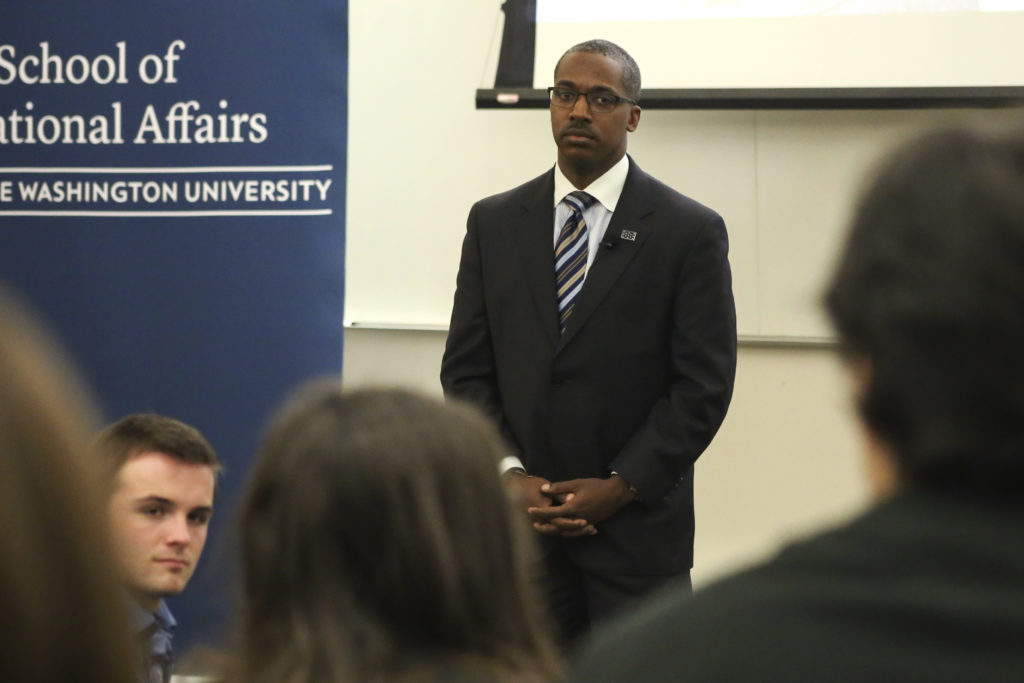The dean of the Elliott School of International Affairs said he’s considering changes to a policy banning single-gender discussion panels that has angered some faculty.
Elliott School Dean Reuben Brigety said the policy, which was implemented this summer and requires gender diversity on panels, symposiums or other multi-speaker events, was meant to address “signs of gender bias” on event panels and promote diverse viewpoints at the school’s events. But after the policy was announced earlier this month, the move drew criticism – and ridicule – from some faculty, right-wing media and legal experts who said it abridged academic freedom and could force panels to include less qualified speakers to meet its conditions.
The policy mandates that panels with three or more speakers must include both male and female speakers and if an event has three speakers of the same gender, the moderator should be of a different gender. Not following the policy “could result in cancellation of the event,” according to an email Brigety sent to faculty Sept. 12.
Brigety said the rule is meant to promote diversity and inclusion at the Elliott School by encouraging professors to consider the makeup of their events as they organize discussions.
“We do not intend to undermine the academic freedom of the Elliott School’s faculty, but to inculcate a sense of urgency about aligning our actions with our stated values around diversity and inclusion,” he said in an email.
The guidelines were approved by the school’s Dean’s Council, a board that meets regularly to discuss matters relating to the school, Brigety said. It went into effect July 1, according to the email.
Brigety said efforts were also being made to adjust the policy and address some of the issues that professors at the Elliott School have had with the new rule impacting their academic freedom.
“The Dean’s Council and I look forward to making adjustments while we continue to pursue full access to the benefits of academic freedom for all members of our community,” he said.
Since it was announced, the policy has been panned by legal experts who said it goes against the academic principle that merit should be the only consideration in holding scholarly discussions and conservative sites, including The College Fix and Breitbart who picked up the story.
Jonathan Chaves, a professor of Chinese at the Elliott School, said he was “outraged” by the new policy because the focus should be on finding speakers with the most expertise for events.
“It’s a total, obvious infringement on common sense to begin with and academic freedom. There’s only one standard that applies to an institution of higher education and that is who the best person is in the field. Period,” Chaves said.
Chaves said gender was not as relevant to panels as other factors, like political affiliation, because gender did not directly relate to how a scholar views topics in international affairs.
“Pick the best people for your panel, the best scholars and that’s it,” he said. “There’s no other way to run such an institution.”
John Banzhaf, a public interest law professor, said the new policy was not only foolish, but also failed to target aspects of diversity that might generate more discussion in panels relating to international relations, like country of origin or political affiliation.
In a statement last week, Banzhaf called the rule a “draconian attempt to prohibit ‘sausage fests'” at Elliott School panels.
“I’m not an expert in international relations but I hadn’t been aware that there was a great gap in the approach of male faculty members and female faculty members. He singled out one criteria which doesn’t seem to be directly relevant to the kind of issues which would come up at a panel on international affairs,” he said in an interview, referring to Brigety.
Instead of requiring that at least one male or one female be included on a panel, Banzhaf said the Elliott School should consider an “affirmative action” approach in which selection committees for panels consist of both men and women, but not necessarily the event itself. He said this system would make diversity a factor in deciding speakers, but it wouldn’t be the only consideration, he said.
“That’s a much fairer way of doing it, a much more reasonable way, and much more likely to guarantee you and other students that they’re going to get the benefit of a variety of viewpoints based on criteria other than their genitals,” he said.
Other universities have faced similar controversies. In 2016, a video game panel was canceled by administrators at the University of Southern California for consisting of only males.
Last spring, the Faculty Senate passed a resolution urging clearer guidelines on academic freedom after a series of high-profile events in which activists targeted controversial speakers on campuses.
Mark Langevin, the director of the Brazil Initiative, said his program already prioritizes making panels as diverse as possible and, while there are no formal committees deciding panelists, there are as many people included in the process as possible. He said he supported the school’s policy.
“I think we should applaud policies like this and work hard to incorporate them into our work,” he said. “It’s something that the students really appreciate and faculty like myself need to work as hard as we can to meet that standard.”
Paula Alonso, an associate professor of history and international affairs, said the policy is part of a broader effort at the school to increase racial, ethnic and gender diversity. Organizers of events should already be considering bringing in diverse viewpoints for Elliott School events, she said.
“I think in a way it is a little bit sad that it’s been almost 100 years since the passage of female suffrage in the United States but we still have to talk about these issues when by now it should be really common sense to do this without having to think of a particular policy or remind people of the policy,” she said.
Lauren Peller contributed to reporting.




